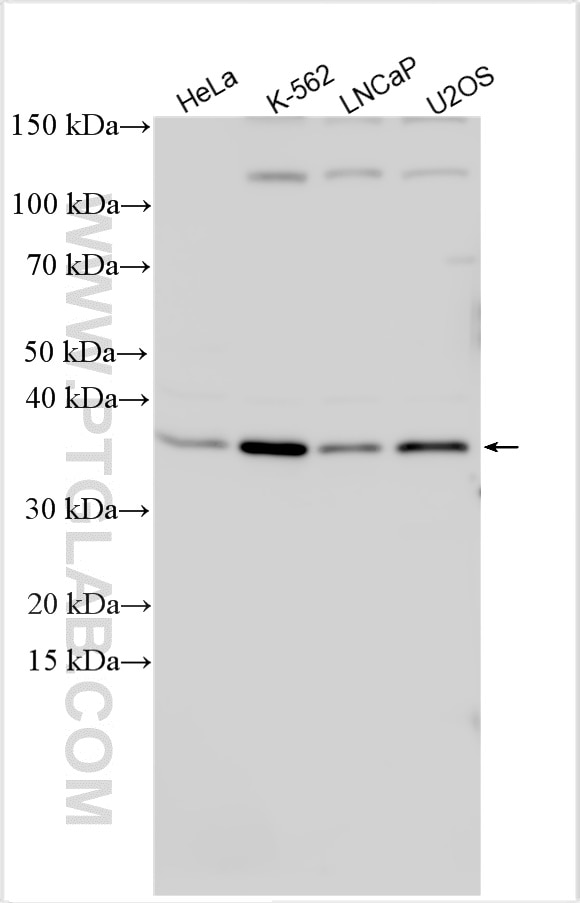CDCA5 Polyclonal antibody
CDCA5 Polyclonal Antibody for WB, ELISA
Host / Isotype
Rabbit / IgG
Reactivity
Human
Applications
WB, ELISA
Conjugate
Unconjugated
Cat no : 29316-1-AP
Synonyms
Validation Data Gallery
Tested Applications
| Positive WB detected in | HeLa cells, K-562 cells, LNCaP cells, U2OS cells |
Recommended dilution
| Application | Dilution |
|---|---|
| Western Blot (WB) | WB : 1:2000-1:12000 |
| It is recommended that this reagent should be titrated in each testing system to obtain optimal results. | |
| Sample-dependent, Check data in validation data gallery. | |
Product Information
29316-1-AP targets CDCA5 in WB, ELISA applications and shows reactivity with Human samples.
| Tested Reactivity | Human |
| Host / Isotype | Rabbit / IgG |
| Class | Polyclonal |
| Type | Antibody |
| Immunogen | CDCA5 fusion protein Ag30966 |
| Full Name | cell division cycle associated 5 |
| Calculated Molecular Weight | 27 kDa |
| Observed Molecular Weight | 27~35 kDa |
| GenBank Accession Number | BC011000 |
| Gene Symbol | CDCA5 |
| Gene ID (NCBI) | 113130 |
| Conjugate | Unconjugated |
| Form | Liquid |
| Purification Method | Antigen affinity purification |
| Storage Buffer | PBS with 0.02% sodium azide and 50% glycerol pH 7.3. |
| Storage Conditions | Store at -20°C. Stable for one year after shipment. Aliquoting is unnecessary for -20oC storage. 20ul sizes contain 0.1% BSA. |
Background Information
Human cell division cycle associated 5 (CDCA5), also known as Sororin, is required for stable binding of cohesin to chromatid in the S and G2/M phases and degraded through anaphase-promoting complex-dependent ubiquitination in the G0/G1 phase (PMID: 30808873). Suppression of CDCA5 expression with siRNAs inhibited the growth of lung cancer cells. CDCA5 positivity is an independent prognostic factor for lung cancer patients (PMID: 20551060). The predicted molecular size of CDCA is 27 kd, with an electrophoretic mobility of ~35 kd on SDS-PAGE, possibly due to its isoelectric point (pI) of approximately 10 (PMID: 22580470).
Protocols
| Product Specific Protocols | |
|---|---|
| WB protocol for CDCA5 antibody 29316-1-AP | Download protocol |
| Standard Protocols | |
|---|---|
| Click here to view our Standard Protocols |


